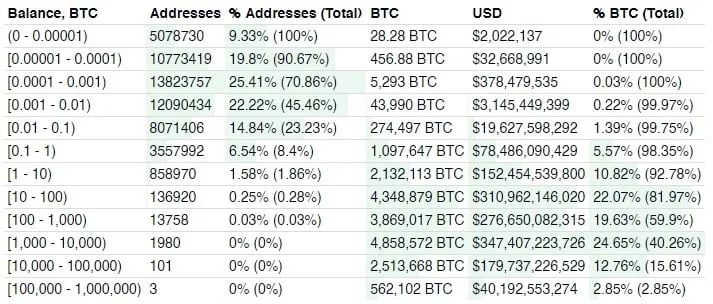
This article was first published in July 2022 and updated in June 2024.
For many years, the idea that publicly traded corporations might buy Bitcoin for their reserves was considered laughable. The top cryptocurrency was considered too volatile, too fringe to be embraced by any serious business.
That taboo has been well and truly broken, with a number of major institutional investors buying up Bitcoin in recent years.
The floodgates first opened when cloud software company MicroStrategy bought $425 million worth of Bitcoin in August and September 2020. Others followed suit, including payments processor Block and EV manufacturer Tesla.
Per BitcoinTreasuries, public companies holding Bitcoin now account for just under 1.5% of the total supply of 21 million BTC.
1. MicroStrategy
MicroStrategy, a prominent business analytics platform, has adopted Bitcoin as its primary reserve asset.
The firm, which produces mobile software and cloud-based services, has aggressively pursued a Bitcoin buying spree, scooping up millions of dollars worth of the cryptocurrency. As of May 2025, it holds 214,400 BTC in reserve, equivalent to $14.8 billion—more than 1% of the total number of Bitcoin that will ever be issued.
At one point, MicroStrategy CEO Michael Saylor said, he was buying $1,000 in Bitcoin every second. In the company’s Q1 2024 earnings call, Saylor claimed that the company’s adoption of a “Bitcoin strategy” had enabled it to deliver 10x to 30x the performance of rival enterprise software companies in the business intelligence sector.
Unlike other CEOs who typically shy away from discussing their personal investments, Saylor has made it public that he personally holds 17,732 BTC—currently worth over $1.2 billion.
Some have asked how much #BTC I own. I personally #hodl 17,732 BTC which I bought at $9,882 each on average. I informed MicroStrategy of these holdings before the company decided to buy #bitcoin for itself.
— Michael Saylor⚡️ (@saylor) October 28, 2020
As per data from BitInfoCharts, this positions Saylor among the top 101 Bitcoin owners—assuming his BTC is all held within a single address. It’s something of an about-face for the MicroStrategy CEO, who in 2013 claimed that Bitcoin’s days were numbered.

“We’re at the beginning of the stage of rapid institutional adoption of digital property in the form of Bitcoin,” Saylor said during the company’s Q1 2024 earnings call. He added that in future, Bitcoin won’t compete against other crypto assets, but against, “gold, art, equities, real estate, bonds, and other types of store-of-value money in wealth creation, wealth preservation, and the capital markets.”
2. Marathon Digital Holdings Inc.
Bitcoin mining company Marathon Digital, unsurprisingly, is also a large holder of Bitcoin, with 17,631 BTC in its corporate treasury (worth around $1.23 billion as of May 2024). The company, which aims to build “the largest Bitcoin mining operation in North America at one of the lowest energy costs,” originated as a patent holding firm (and was often referred to as a patent troll) before its pivot into crypto mining.
As of May 2024, Marathon Digital runs some 240,000 Bitcoin miners capable of producing 29.9 EH/s, with an average operational hash rate of 21.1 EH/s.
The firm noted that it is accelerating its growth plans following the 2024 Bitcoin halving, in a bid to “mitigate the impact,” adding that it hopes to double the scale of its mining operations in 2024.
However, the firm missed its Q1 2024 revenue target, citing challenges including “unexpected equipment failures, transmission line maintenance and higher than anticipated weather-related curtailments at Garden City and other sites.”
3. Tesla

Electric vehicle manufacturer Tesla joined the ranks of companies holding Bitcoin in December 2020, with an SEC filing revealing that the company invested “an aggregate $1.50 billion” in Bitcoin.
Tesla sold 10% of its Bitcoin holdings in Q1 2021; according to CEO Elon Musk, this was “to prove liquidity of Bitcoin as an alternative to holding cash on balance sheet.”
The company’s Bitcoin play followed months of speculation, after CEO Elon Musk took to Twitter to discuss the cryptocurrency. In late 2020, MicroStrategy’s Saylor offered to share his “playbook” for Bitcoin investing with Musk, after arguing that a move into Bitcoin would be doing Tesla shareholders a “$100 billion favor.”
However, Musk and Tesla have had an on-off relationship with Bitcoin. After announcing that Tesla would accept payments in Bitcoin for its products and services in March 2021, just two months later the CEO abruptly announced that the company would no longer accept the cryptocurrency for payments.
Citing the “rapidly increasing use of fossil fuels for Bitcoin mining and transactions”, Musk revealed that the company wouldn’t be selling any of its Bitcoin holdings, and would consider using it for transactions again once mining “transitions to more sustainable energy.” He later clarified that the company would resume using Bitcoin for transactions once miners are using 50% clean energy.
In July 2022, the company revealed that it had sold “approximately 75%” of its Bitcoin in its Q2 2022 quarterly update, with its balance sheet showing sales from digital assets amounting to $936 million. In a call with analysts, Musk stated that the firm did so in order to shore up its cash position in the face of uncertainty around COVID lockdowns. At the time, he added that the company is, “open to increasing our Bitcoin holdings in future, so this should not be taken as some verdict on Bitcoin.”
As of May 2024, the company holds 9,720 BTC in its portfolio (worth around $677 million at current prices), per bitcointreasuries.org. The firm has maintained its Bitcoin position, with its Q1 2024 balance sheet showing an estimated $184 million for both Q3 2023 and Q1 2024.
Musk has also emerged as a keen advocate of Dogecoin, with Tesla enabling Dogecoin purchases for some merchandise.
4. Hut 8 Mining Corp
Bitcoin mining firm Hut 8 holds 9,109 BTC, worth around $644 million at current prices.
In June 2021, the company was listed on the Nasdaq Global Select Market under the HUT ticker, with the company’s SEC filing noting that it’s “committed to growing shareholder value by increasing the number and value of our bitcoin holdings.”
The company also explained that it generates fiat income by leveraging its reserve of self-mined and held Bitcoin, “via yield account arrangements with leading digital asset prime brokerages.”
In November 2023, the firm merged with fellow Bitcoin mining company US Bitcoin, with the post-merger firm billing itself as an “energy infrastructure company targeting bitcoin mining and data centers.” Those mining centers are based at six sites in Alberta, Texas and New York, with a reported 7.5 EH/s of installed self-mining capacity.
In its Q1 2024 results, the firm reported revenue of $51.7 million for the quarter, an increase of 231% year-on-year.
This morning, Hut 8 announced results for the first quarter of 2024. Revenue grew to $51.7 million, Net Income attributable to Hut 8 grew to $250.9 million, and Adjusted EBITDA grew to $297.0 million. We held 9,102 self-mined Bitcoin on our balance sheet as of the end of the…
— Hut 8 (@Hut8Corp) May 15, 2024
5. Riot Platforms, Inc.
Another crypto mining outfit, U.S.-based Riot Blockchain holds 9,084 BTC, worth $643 million at today’s prices.
With its valuation surging from below $200 million in 2020 to highs of over $6 billion in 2021, the Nasdaq-listed company went on an aggressive expansion drive. In April 2021, it spent $650 million on a one-gigawatt Bitcoin mining facility in Rockdale, Texas; describing the purchase as a “transformative event” that would make the company the “largest publicly-traded Bitcoin mining and hosting company in North America, as measured by total developed capacity.”
In April 2022, Riot revealed further plans to expand in Texas, with the announcement of a further one-gigawatt mining facility in Navarro County. Following the 2022 crypto crash, CEO Jason Les told Yahoo Finance that Bitcoin mining will “continue to flourish in the United States,” and that “even though Bitcoin mining economics have gone down, there’s still tremendous opportunity here.”
By January 2023, the firm had rebranded to Riot Platforms in a bid to diversify its business model, as the crypto mining industry struggled with an ongoing crypto winter and increased energy prices.
In early 2024, the firm warned shareholders that there was “no guarantee” the impending Bitcoin halving would positively impact on its profitability. In June, the company was targeted by short seller firm Kerrisdale, which argued that “Bitcoin mining is one of the stupidest business models we’ve come across in our time short selling over the past 15 years,” but its stock price quickly recovered after initially dipping on publication of the report.
6. Coinbase Global, Inc.
Arguably the best-known crypto firm in this list, crypto exchange Coinbase went public in a landmark direct listing on the Nasdaq in April 2021.
Ahead of its listing, in February 2021, Coinbase revealed that it held $230 million in Bitcoin on its balance sheet. By June 2024, it held 9,000 BTC in its treasury, worth just under $642 million.
7. Galaxy Digital Holdings
Crypto-focused merchant bank Galaxy Digital Holdings holds 8,100 BTC. That’s down from the 16,400 BTC it held in July 2022, though the increase in the price of Bitcoin since then means that the dollar value of its holdings in June 2024 is just shy of $578 million, versus the $357 million its stash was worth two years earlier.
Founded by Michael Novogratz in January 2018, the company has partnered with crypto firms including Block.one and BlockFi. Novogratz is, unsurprisingly, a keen advocate for Bitcoin, arguing in March 2024 that the cryptocurrency would never dip below $50,000 again, and months later predicting that it would soar to $100,000 by the end of the year.
Galaxy Digital is one of a number of firms managing a U.S. spot Bitcoin ETF, following their landmark approval by the SEC in January 2024.
8. Block, Inc.
Alongside Tesla, Block, lit the fuse for institutional investment in Bitcoin with its October 2020 investment of $50 million in the cryptocurrency.
By June 2024, the firm held 8,027 BTC, worth around $573 million. It is, perhaps, unsurprising, considering that CEO Jack Dorsey is an enthusiastic advocate for Bitcoin (even running his own Bitcoin node).
At the time of its initial investment, the company described it as “part of Square’s ongoing commitment to bitcoin,” noting that “the company plans to assess its aggregate investment in Bitcoin relative to its other investments on an ongoing basis.”
The firm has invested in Bitcoin technology, launching its own Bitcoin wallet and developing a Bitcoin mining ASIC chip. In April 2024, its payment services subsidiary Square announced that it would enable businesses using its Cash App product to automatically convert a portion of daily sales into Bitcoin.
In May 2024, the firm announced that it would reinvest 10% of its profits from Bitcoin-related products and services into BTC, in a dollar cost average (DCA) purchase programme.
The company changed its name from Square to Block in December 2021, in an apparent reference to the blockchain technology that underpins Bitcoin. The rebrand followed Dorsey’s announcement a week earlier that he was stepping down as Twitter CEO to focus on the payments company.
9. CleanSpark
U.S. Bitcoin mining firm CleanSpark holds 6,154 BTC, worth around $439 million as of June 2024.
Ahead of the 2024 Bitcoin halving, the firm expanded its operations, snapping up three Bitcoin mining facilities in Mississippi for $19.8 million, adding up to 2.4 EH/s to its mining capacity. The company also added a third facility in Dalton, Georgia to its line-up, adding an additional 0.8 EH/s.
In June 2024, CleanSpark revealed that it had mined 417 BTC in the month of May, claiming to have “outperformed industry expectations” in its first full month of production following the halving. The company added that it plans to further expand to a site in Wyoming “in the coming days.”
10. Bitcoin Group SE
Germany-based venture capital firm Bitcoin Group SE brings up the rear of the list, with relatively modest holdings of 3,830, worth $275 million at current prices.
Its investments include crypto exchange Bitcoin.de and Futurum bank, which merged in October 2020 to form “Germany’s first crypto bank.”
The move followed the German parliament’s decision to enable banks to sell and store cryptocurrencies, with Bitcoin Group SE managing director Marco Bodewein highlighting the opportunity to introduce the bank’s institutional investors to crypto’s “high returns and safety features.”
Daily Debrief Newsletter
Start every day with the top news stories right now, plus original features, a podcast, videos and more.



